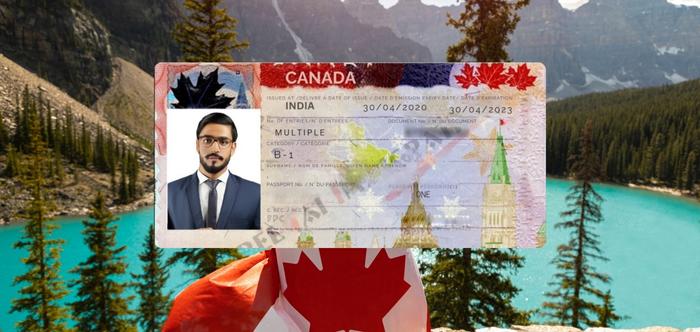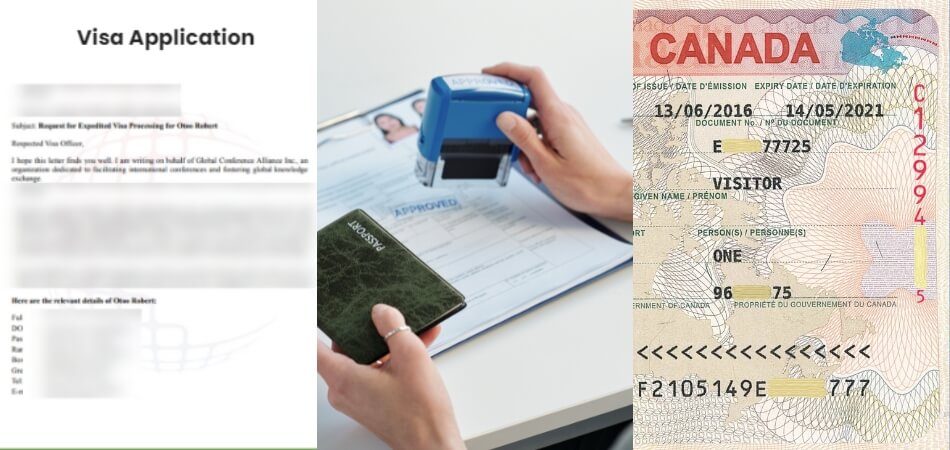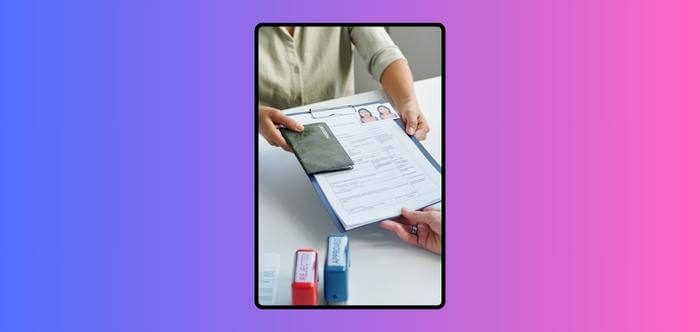Managing the visa application process can sometimes feel like a maze. Many individuals find themselves overwhelmed by the requirements and steps involved. Yet, attending international conferences is a valuable opportunity for growth and networking. So, you might be wondering, how can I get a Canada conference visa from India?
The secret is being well-prepared and aware of the procedure. You must apply on the official Canada immigration website in order to receive a Canada Conference Visa from India. Get your passport, travel itinerary, proof of finances, and conference invitation, among other important documents. Show up for an interview if necessary. Await clearance before making travel arrangements.
In this blog, we’ll guide you through the steps and tips for getting your Canada Conference Visa from India. Get ready for a smooth journey to your conference in Canada with the essential information you need.
The Core Purpose of a Canada Conference Visa?
The Canadian Conference Visa serves a distinct and critical role in global collaboration. It primarily facilitates the entry of international professionals into Canada for short-term academic, business, or scientific conferences. By granting access, it bridges gaps, allowing experts from various fields to meet, share knowledge, and develop partnerships.

While most might view this visa merely as an entry permit, its broader implication lies in nurturing global connections. The Canadian conference visa is renowned for its pioneering research and innovative ventures, has become a hub for knowledge exchange. Through these interactions, attendees gain insights, expand their horizons, and contribute to global advancements.
Lastly, by endorsing such events, Canada strengthens its international relations and positions itself as an inviting destination for intellectual discourse. It’s not just about attending an event; it’s about building relationships, nurturing talent, and championing a future of united progress.
Eligibility and Requirements for a Canadian Conference Visa
It might be tough to figure out the visa system, but understanding is essential. Here, we break down the eligibility and requirements for a Canadian Conference Visa, helping you step confidently into your application.
Official Invitation
Every applicant must possess an official invitation from the conference organizers. This document confirms your participation and the reason for your visit. It must clearly state the conference details and your role in it. For example, an invitation to the International Conference in Canada 2024 should highlight your involvement and the event’s significance.
Proof of Funds
Demonstrating your financial stability is crucial. Authorities want assurance you can support yourself in Canada. Bank statements or a letter from your bank can serve this purpose, showcasing your ability to cover expenses.
Valid Passport
Your passport acts as your primary identification. It must remain valid for at least six months post your intended departure from Canada. Ensure it has blank pages for visa stamping.
Travel Itinerary
Show your travel plans, even if they’re tentative. This includes your entry and exit dates, accommodation details, and other travel specifics. It gives officials a clear view of your intended stay.
Ties to Home Country
This criterion emphasizes your intention to return home post-conference. Evidence might include job contracts, property ownership, or family ties. It’s all about proving your commitment to your home nation.
Medical Examination & Police Clearance
For longer stays or in specific countries, a medical exam might be needed. Additionally, police clearance may be required, ensuring you have no serious criminal history. Both aspects fortify your visa application’s integrity.
Knowing the requirements and eligibility criteria is paramount. With the right knowledge and preparation, securing a Canadian Conference Visa can be a streamlined experience. Remember, clarity and authenticity in your application are vital.
How Can I Get a Canada Conference Visa from India?
It’s necessary to prepare diligently to be successful at an international conference. Amidst the excitement and precise scheduling, one question remains vital, “How Can I Get a Canada Conference Visa from India?” To help you make your way through this process, here’s a comprehensive step-by-step guide.
Step-1. Initiate Online Application
Start by visiting the official Canadian immigration website, IRCC, to kick off your visa application process. Creating an account on this platform is your first step. This account will allow you to manage and track your application efficiently.
Once your account is set up, select the visa category that fits your needs—usually the Temporary Resident Visa (TRV) for conference attendance. Carefully complete the application forms provided. Accuracy is key, so double-check all your details to prevent any potential delays or issues with your application.
Taking these steps ensures you start the process correctly, setting a solid foundation for a successful visa application.
Step-2. Gather Essential Documents
Compiling the necessary documents is crucial for a smooth visa application process. Start by collecting an official conference invitation that clearly outlines the event’s purpose and your role. This document is fundamental in demonstrating the legitimacy of your visit.
Next, ensure your passport is valid for at least six months beyond your intended stay in Canada. This is a key requirement to avoid any potential issues with entry. When applying for a Canadian conference visa for Indians, it’s essential to meet this requirement to prevent unnecessary complications.
Lastly, provide proof of financial stability through bank statements or a letter of sponsorship. A detailed travel itinerary also helps, as it shows your planned activities during the visit. Double-check all documents for accuracy to avoid any delays or rejections.
Step-3. Pay the Visa Fee
Paying the visa fee is a crucial step in your application process. This fee is non-refundable, meaning it will not be returned if your application is rejected. The amount can differ depending on the type of visa you’re applying for and how long you plan to stay in Canada.
Ensure that you make the payment through the official website or other recommended channels to avoid any complications. This ensures that your payment is secure and properly recorded.
After completing the payment, keep the receipt or confirmation email as proof. This documentation may be required later in the process, so it’s important to keep it safe and accessible.
Step-4. Schedule a Biometrics Appointment
Once you’ve completed your payment, the next step is to schedule your biometrics appointment. You’ll receive instructions to book this appointment at the nearest Visa Application Centre (VAC). This step is crucial as it involves collecting biometric data, which includes your fingerprints and a photograph.
Biometrics helps Canadian authorities verify your identity and strengthen the security of your visa application. It’s an essential measure to prevent fraud and ensure that the information you provide matches your physical identity.
Make sure to attend your appointment on time and bring any required documents. Completing this step accurately is key to moving forward with your visa process smoothly.
Step-5. Attend an Interview if Summoned
If you’re summoned for an interview as part of your visa application process, it’s crucial to prepare thoroughly. Familiarize yourself with every detail of your application so you can answer questions confidently. Review your travel plans, the conference details, and your reasons for visiting Canada.
During the interview, you’ll need to present original documents to support your answers. Make sure you bring all necessary paperwork, such as your passport, invitation letter from the conference, proof of funds, and any additional documents requested. This helps to verify the information you provided in your application.
Approach the interview with a calm and honest demeanor. Be clear and truthful in your responses, and don’t hesitate to provide additional information if needed. The goal is to demonstrate that you meet all the requirements and are genuinely intending to attend the conference.
Step-6. Await the Decision
After submitting your visa application, the waiting game begins. Processing times can differ widely depending on factors such as the volume of applications and the details of your submission. This period might feel lengthy, but it’s a crucial part of the process.
During this time, it’s important to stay proactive. Regularly check your email or visa application account for any updates or requests from the consulate. Sometimes, additional information or documents might be needed to complete your application.
Patience is key, but be prepared to respond quickly if the consulate reaches out. Keeping a close eye on your application status helps ensure you’re ready for any next steps or follow-up requests.
By following this enriched guide, acquiring a Canadian Conference Visa from India becomes less daunting. Preparedness and attention to detail will streamline your application process, bringing you one step closer to your Canadian endeavor.
Types of Conference Visas Available to Indian Citizens
Indian citizens planning to attend conferences in Canada often wonder about the types of conference visas available to them. Understanding these visa options is crucial for a smooth travel experience. Let’s explore the various types of conference visas tailored to Indian citizens’ needs.
Temporary Resident Visa (TRV)
The Temporary Resident Visa, often called the tourist visa, is popular among Indian conference-goers. It allows stay up to six months and can last up to 10 years. Apply in advance and provide a clear conference plan for a successful application.
Business Conference Visa
Tailored for professionals, this visa supports those attending business conventions. It aids entrepreneurs, managers, and corporate attendees in broadening their global networks. The emphasis is on promoting business collaborations and trade partnerships.
Academic Conference Visa
This visa suits scholars, researchers, and academicians. It’s designed for individuals presenting papers, attending seminars, or joining academic conventions. The objective is to encourage knowledge exchange and academic growth.
Scientific Symposium Visa
Scientists and researchers benefit from this specialized visa. Attendees can participate in symposiums, workshops, and science conventions. It contributes to innovation, research collaborations, and advancements in various scientific domains.
Art and Culture Seminar Visa
Artists, writers, and cultural advocates find this visa apt. It covers literature festivals, art expos, and cultural seminars. This platform aims to celebrate diverse artistic expressions and cultural dialogues.
Tech and IT Meetup Visa
Designed for IT professionals and tech enthusiasts, this visa focuses on tech meetups, IT conventions, and software symposiums. Attendees explore technological advancements, forge partnerships, and engage in groundbreaking dialogues.
NGO and Social Impact Conference Visa
For those involved in non-profit sectors and social initiatives, this visa offers a gateway. Attendees engage in forums, workshops, and discussions centered around global social issues. The goal is to drive change, create collaborations, and promote humanitarian efforts.
India offers a diverse array of conference visas, ensuring its citizens can participate in global events that resonate with their professional or academic pursuits. Selecting the right visa type is crucial, so understanding each one’s specific purpose ensures a smoother application process and a successful overseas conference experience.
What Should I Do if My Conference Visa Application is Rejected?
If your conference visa application is rejected, it can be disheartening, but don’t lose hope. Here’s a step-by-step guide on what to do next.
Understand the Reason for Rejection
First, carefully review the rejection notice or letter from the visa authorities. They typically provide a reason for the denial, which could range from incomplete documentation to concerns about your ties to your home country. Having a clear idea about the exact cause is crucial for addressing the issue effectively.
Address the Issues
Once you know why your application was rejected, take the time to address those issues. For example, if the problem is incomplete documentation, ensure you gather and submit all the required documents correctly.
When applying for a Canadian Conference Visa, it’s essential to provide all requested paperwork and information. If the issue was related to insufficient proof of ties to your home country, provide additional evidence such as employment letters or family connections.
Consider Reapplying
After correcting the issues, you can consider reapplying for the visa. Make sure your new application is thorough and meets all the requirements. Double-check your documents and information before submission to avoid repeating previous mistakes.
Seek Professional Assistance
If you’re unsure about how to address the issues or need help with the reapplication process, consider consulting a visa consultant or immigration lawyer. They can provide expert advice tailored to your situation and increase your chances of a successful application.
Explore Alternative Options
In case reapplying isn’t viable, explore other ways to attend the conference, such as virtual participation if the conference offers online options. Sometimes, conferences provide alternative solutions for participants who face visa challenges.
Stay Positive and Persistent
A visa rejection is not the end of your journey. Stay positive and persistent. Many applicants face setbacks but eventually succeed with the right approach and preparation. Keep working towards your goal, and your efforts will pay off.
Tips for a Smooth Canada Conference Visa Application
Acquiring a Canada Conference Visa requires meticulous preparation and an understanding of the process. While the steps might seem daunting, some handy tips can make your application journey smoother. Let’s explore these vital pointers:
- Research Thoroughly: Begin by visiting Canada’s official immigration site. Familiarize yourself with visa requirements and recent updates. This initial step reduces potential hiccups later.
- Prepare Documents Early: Start collecting your required documents well in advance. This ensures you don’t rush last minute, decreasing the chances of errors or omissions.
- Be Clear and Concise: While filling out forms, clarity is vital. Avoid ambiguous answers and always provide accurate, straightforward information to avoid any misunderstandings.
- Seek Professional Help: Consider consulting with visa agents or professionals. Their expertise can guide you, offering insights and maneuvering through complex application sections.
- Stay Updated on Changes: Immigration rules can evolve. Regularly check official sites or subscribe to updates to stay informed about any new requirements or changes.
- Review Multiple Times: Before submission, review your application multiple times. Cross-check details to ensure consistency and accuracy in all provided information.
- Maintain Honesty: Always be truthful in your application. Even minor discrepancies can lead to rejections. Honesty ensures a higher chance of approval.
- Track Your Application: After submission, actively track your application status. This helps you stay informed and promptly respond to any additional requests.
- Prepare for an Interview: While not always required, be ready for a potential interview. Familiarize yourself with your application to answer questions confidently.
- Plan Your Travel Post-Approval: Don’t book flights or accommodations prematurely. Await visa approval first to avoid potential losses or complications.
Frequently Asked Questions
Can I apply for a Canadian conference visa online?
Yes, you can apply for a Canadian conference visa online. The process is straightforward through the official Canadian immigration website. Just ensure you have all your documents ready and follow the instructions carefully for a smooth application experience.
Do I need to attend an interview for a Canada conference visa?
Attending an interview for a Canada conference visa isn’t always required, but it might be requested in some cases. If you do get called for an interview, it’s a chance to further explain your travel plans and intentions. Stay prepared and honest.
Can I extend my stay in Canada after the conference?
Yes, you can apply to extend your stay in Canada after the conference. Be sure to apply before your current visa expires and provide a valid reason for the extension. It’s best to start this process early to avoid any issues.
Is it possible to expedite the processing of a Canadian conference visa?
Unfortunately, you can’t expedite the processing of a Canadian conference visa. To avoid delays, it’s best to apply well in advance of your intended travel dates. Planning ahead ensures you have ample time for any unexpected issues.
How long does it take to get a Canada conference visa from India?
It typically takes a few weeks to process a Canada conference visa from India. However, times can vary based on factors like application volume and individual circumstances. To avoid any last-minute issues, apply well in advance of your conference date.
Conclusion
Obtaining a Conference Visa for Canada from India may seem difficult at first. The amount of paperwork, the several steps, and the waiting period could seem excessive. But the secret is to comprehend every stage of the application procedure. Applicants may simplify a large portion of the procedure by understanding the main goal, being aware of eligibility requirements, and distinguishing between the various visas.
The question, “How can I get a Canada Conference Visa from India?”, is not just about paperwork but also about preparation. Thorough research, early documentation, and a truthful approach can streamline this journey, making it less cumbersome. Remember, every form and every interview is a step closer to the enriching experiences awaiting in Canada.
For professionals, scholars, and enthusiasts, Canada is a hub of opportunities, growth, and networking. With a well-guided and informed approach, the dream of attending global events in this country becomes not just a possibility but a forthcoming reality. Stay patient, stay informed, and let Canada’s intellectual allure guide you through.







